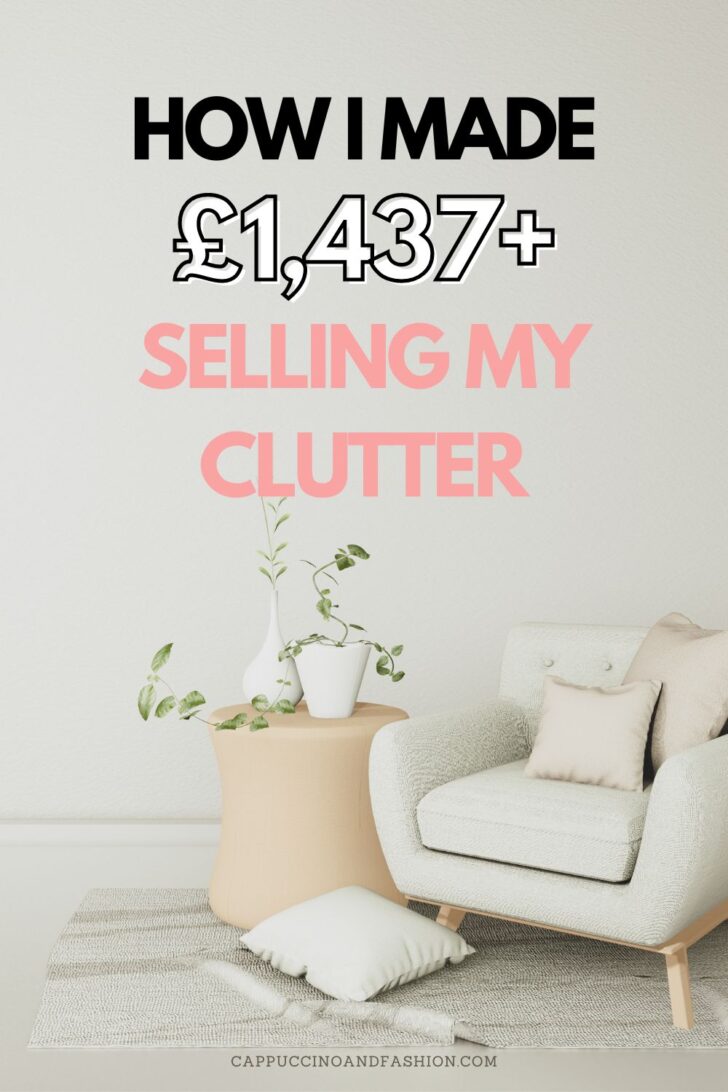This post may contain affiliate links, meaning I make a commission if you purchase through my links, at no extra cost to you. Disclosure here.
Did you know you can actually sell your clutter to make some cash?
Over a year ago, we decided to go for a more minimalist route with our lifestyle.
So we decluttered and got rid of any items that didn’t bring value to our lives: sell them, donate them, or recycle them.

Is it worth selling your clutter?
Throughout this process, we made over £1,400 selling things we no longer needed, and we haven’t even sold that much of what we decluttered.
It’s only a small fraction of what we actually got rid of.
For a lot of it, we didn’t feel like going through the hassle of selling, so we just donated or took to recycling.
But in this article, I’m going to share with you exactly how to sell, where to sell, how much to charge, all of those things so you can get rid of your own clutter and make some money as well.
Feel free to watch the video or keep reading below:
Is it worth keeping things in storage?
You probably have a lot of ‘no longer needed’ items at the moment.
This is not to make you feel bad or guilty in any way, that was me as well.
But you too probably have a garage, a loft, or a spare room, filled with clutter.
It’s one of those dumping grounds, where you just pop boxes in as they arrive and things you don’t want to think about at the moment.
So stuff piles on and on, and soon enough we’ve got this whole bunch of clutter that might be worth thousands if we were to actually sell it.
And it’s stuff that’s not bringing any sort of value to our life, since very often we don’t even know what’s behind all of those boxes or we don’t even need or use that stuff.
Or even if we needed it, we wouldn’t be able to find it. We wouldn’t know where it is, and we would probably go and repurchase it from the shop again.
This is what I have done multiple times when I couldn’t find things because of my clutter – and then I would find the item I had been looking for after I had repurchased it.
This made me realize, what a waste of time and money that was!
Our garage was actually filled with items that we no longer needed and that we weren’t using. And honestly, I wouldn’t have been able to even tell you everything that was in there.
If you ask me now about all the things I got rid of, I probably couldn’t even tell you half of them because I don’t miss them.
I didn’t really care about them. I didn’t have any use for them.
They were just stressing me out, having in the back of my mind the thought that there was this space in my garage that was full of stuff.
And I knew I would have to deal with it eventually, either when we would move, or when we needed space in the garage, or when I’d be looking for something.
Why does clutter stress me out?
You may be aware that, sooner or later, you too will have to deal with the clutter in your own garage, loft, or spare room.
And that adds to your stress levels.
I read this article that said that, according to a CEFL study, the amount of stuff that we have in our homes, especially for women, is directly proportional to the amount of stress that we feel.
So the more stuff we have, the more stress we feel.
Reading this, it really made sense to me, and that’s how I felt too.
As with our garage, during last winter, which might’ve been more humid or colder than usual, it got quite damp.
Unfortunately, a lot of the items that were stored there and that were not in bags or containers got ruined.
They got stained, they got mouldy, and they became unusable.
A lot of them had to be tossed, and this made me feel so guilty at the time. Not only did I have these items in my garage for about 3 years gathering dust because I wasn’t using them, but I ended up throwing them away.
Had I decluttered sooner, I could have maybe passed them on to someone who might have made use of them.
But I had kept them ‘just in case’ in my garage, and now that they were mouldy, I had to toss some of them away.
This waste of resources made me feel sad because I could have sold some of the items to make some money, and somebody else might have really benefited from those items as well.
This incident was a big wake-up call for us, and it definitely sparked a change in us.
How do I decide whether to sell or donate?
To break it down, my rule here when I have an item I no longer need is, I ask myself:
Is it in good condition?
- If not, then I toss or recycle it, depending on what it is.
- If yes, if it’s in good condition, then the next question I ask myself is: Do I currently have the energy to handle the selling process?
- If not, if I’m in a really busy season right now, then I will simply donate, and get it out of my house as quickly as possible.
- If yes, if I have the energy and some time to quickly snap some pictures, then I try to sell it for 2 weeks. If it doesn’t sell within 2 weeks, then I donate it.
This is my system for smaller items.
For big furniture items, I don’t want to deal with delivery because things can get broken on the way, plus it can be really expensive to send something that’s huge and bulky.
So what I do with these items is to put them up for sale on eBay with ‘collection only’. That has worked really well for us so far.
I don’t usually use Facebook Marketplace. I know some people love it.
If you do, you do what you feel comfortable with, what works for you. But for me, I noticed that Facebook Marketplace can be a bit more scammy, especially if you meet somebody to collect the item, but they haven’t actually paid for it yet.
Whereas on eBay they have to pay, and then you arrange a meetup for them to collect the items. And I just like that extra security.
When it comes to selling second-hand items, I actually have three places where I sell them.
Selling your clutter on Vinted
The first one is Vinted, which I love because it’s an app on your phone, really easy and simple to use.
And it’s especially useful for things like baby products, and clothes.
On Vinted I sold quite a lot of my baby’s items that she had outgrown, and also some clothes from my wardrobe.
I also used Vinted to purchase clothes because I realised it’s such a good marketplace for this kind of thing.
It’s also very affordable, especially for baby items since they only wear them for maybe 2 months at a time, and then you can pass them on as they’re still in good condition.
So, Vinted is a big one for me.
Selling your clutter on eBay
We also used eBay for some items, because you can’t use Vinted for everything.
I don’t think you can put electronics on Vinted, so eBay was perfect for that.
Also on Vinted, there’s no ‘collection only’ option at the moment, which would be needed for big pieces of furniture.
So I put any larger piece of furniture on eBay because you have that filter to show you the items that are within a range from you.
This way, people can actually search for a bed that’s close to them, that they can actually collect.
Selling your old books on Ziffit
This is the third service that we use to sell our items.
Ziffit is the perfect place to sell your books. We had a lot of books, and I simply didn’t want to keep all of them anymore.
I had read most of them, and I wasn’t really planning on reading them again.
Sometimes we keep books thinking, “Maybe some friends would come over and we would have a chat about the book, and I would like to maybe lend it to them.”
That’s what I used to think at least.
But I realised I didn’t need to keep all of these books in my home to have meaningful conversations with my friends. I don’t have to store this whole library of books for that purpose.
If it’s a book I want to reference back to, as I do have a few of those, then I will keep it.
In most cases though, I didn’t want to reference them again, and I didn’t want to read them again, so I just passed them on.
If at some point I do realise that I actually do want to reread a book, I can always go and get it from the library, for example.
With Ziffit it’s really easy to sell your books. You go on their app, you scan the barcodes on each book, and you instantly find out how much money they will give you for them. They also tell you if they accept each book, as there are a few books they won’t accept.
But in our case, for the most part, they did.
Then you put all of the accepted books in a box, and they will give you a day when they will come and collect it from your house.
How convenient is that? I really loved using that service.
If you go through my Ziffit link, you get an extra £5 on your first Ziffit book sale (this is not sponsored by the way, just a referral link).
How much I made selling my clutter
Now let’s look at exactly how much we made from each of these platforms.

On Vinted, I made £463 since I started selling things.
I think this is an insane amount of money if you consider that things like baby clothes and your clothes are worth very little when you sell them again. But it really does add up.
On eBay, we made £947, and that was mainly from selling:
- a rug that we never used, we were just keeping it in the garage, and I wanted to sell it before it got ruined too
- a big full-length mirror that we weren’t using anymore
- a bed from when we replaced my son’s bed
- a desk chair that my husband wasn’t using anymore
- some Legos, since my son had quite a collection of Legos, and there were some sets that he didn’t ever gravitate towards
On Ziffit, from books, we didn’t get a huge amount of money, but at least I know they ended up with somebody who is going to enjoy them. In total, we made £27 from two piles of books that we sent.
These made up a total of £1,437 selling our clutter. Money made from things we no longer needed.
The outbox method of decluttering
Now, when you get started selling your items, what I recommend is having what is called an ‘outbox’.
This is just a box or basket where you store things that will soon leave your house.
We have lots of different ways of bringing stuff into our homes, but we usually don’t have a system for getting stuff out, right?
I haven’t had something like this for years. Becoming more of a minimalist, I learned this idea of an outbox, and I thought it was brilliant.
So I have an outbox at the bottom of each of our closets, and I also have one in our under the stairs cupboard.
Sometimes I open my closet, and think, ‘I really need to get rid of this.’
Or I will go into my kids’ closet, and realise they’re not gonna wear a certain item anymore. Maybe it doesn’t fit them anymore.
I don’t put it back in the wardrobe.
Instead, I take it out and put it in the outbox, because it needs to go.
When I decide something’s going in the outbox, I also decide if I am going to donate it or sell it.
If I decide to donate, I just put it in the outbox. Then, the next time I have a trip to one of those places where you can put clothes donations or when we get one of those bags for donations through the post, I just go around the house, grab everything from the outboxes, and that’s it—all done.
If I decide I’m going to sell a certain item, before I put it in the outbox, I go quickly to a flat surface (my bed, or the floor, wherever I can), and just quickly snap a few pictures. It doesn’t take very long at all. And I just put them straight in the outbox after that. Then I have the pictures to upload onto Vinted, for example, which takes me 2 minutes, or eBay, depending on where I decide to sell it.
I think if you make this kind of a speedy process, without overthinking it, without putting it in your wardrobe and thinking, ‘Yeah, I’ll just handle it one day, you prevent it from lingering in there.
I go through this process quite swiftly, because my goal is to get things out of my house as quickly as possible when I’m decluttering.
I also like to give myself a time frame. This means that I put something on Vinted, and if it doesn’t sell within two weeks, then it’s going to be donated.
Or if there’s absolutely no interest in that item, again, it gets donated.
I don’t have the time or the mental energy to have that stuff cluttering up my closet for months.

The sunk-cost fallacy
One thing I did want to mention when selling your items, and this is something really big, it’s the sunk-cost fallacy.
The idea is that we spend some money on these products, and in some cases, we spend a lot of money.
Then when we decide to sell them, we have this feeling of needing to get our money back.
Plus we often feel guilty, because we bought this product, we spent a lot of money on it, and we never or rarely used it.
So we feel like we are entitled to that money back.
But the truth is that money is gone.
The waste had already been created when we purchased the item.
All we can do now is let it go, free up the space in our home, and learn from this for future purchases.
I’ve been through this too.
I felt so bad because I did pay a lot of money for some of these items, and then I realised that I had never used them, or I had used them just a couple of times.
So it turned out I actually didn’t need it as much as I thought I would. This doesn’t feel good.
Yet I feel like I have learned from those mistakes on what purchases to make in the future.
Plus I’m also a lot more intentional in my shopping because I realise all of these items I’m going to have to handle at some point—sell, donate, move around, organise.
So it’s definitely made me a more conscious shopper.
When I am selling my things, I accept pretty much any offer I get, because my goal here is not to get my money back.
That money is gone, and once a product has been opened or kept in storage for a while, even if it’s in the original box or has tags on it, it just doesn’t have the same value anymore.
We simply need to accept this in order to move forward and make progress with our clutter.
Our goal is to get this product that we no longer use to somebody who will hopefully make use of it, and they will also get a real bargain for it as well.
That’s why any offer they make will do for me.
Any cash that I make from selling my clutter is, for me, just the cherry on top of everything.
I never set out to sell my clutter to make a fortune. I just want to make sure it gets to a good home, it gets used, and it doesn’t just end up being wasted in my garage.
If you are in the process of decluttering and selling your clutter, I would love to hear from you in the comments below. Let me know how you’re getting on, what items you think you could sell, and if you have any questions in the process.




